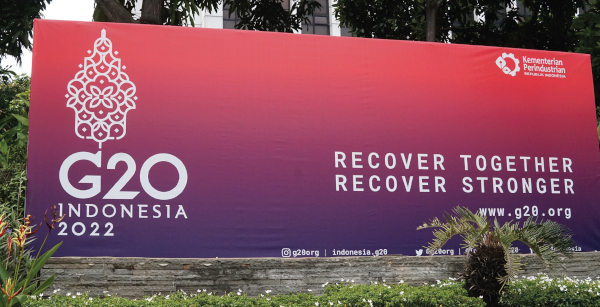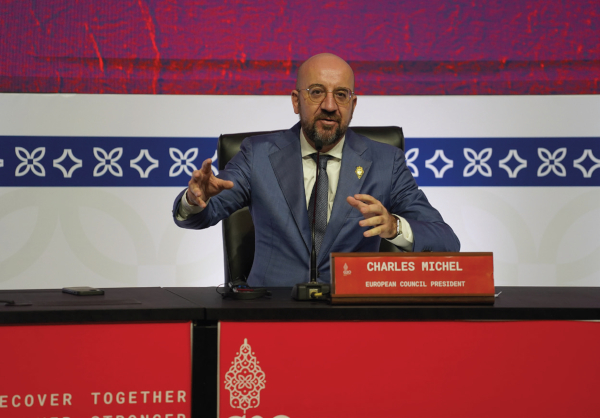
Inviting international enemies for dinner is rarely a wise idea, especially if resurrecting the global economy is on the menu. While President Joko Widodo (Jokowi) of Indonesia might not have expected the leaders of Russia and Ukraine to put the world to rights over a plate of nasi goreng, he did hope they would both attend. But this year’s G20 summit was more of a G19, with Russian President Vladimir Putin nowhere in sight.
Rumours of Putin’s virtual attendance, and boycotts from the US, created a stir before anyone had even landed on Balinese soil. But when Moscow announced that Putin would not be attending this year’s summit, the diplomatic potential of the event was somewhat marred.
In what was tipped to be the most high-profile summit in years, full attendance was widely considered the benchmark for success. “Jokowi’s focus is to make sure that the principal leaders – Xi Jinping, Putin and Biden – are all present,” Vasuki Shastry, associate fellow of the Asia-Pacific programme at Chatham House, told me ahead of the meeting. “At a bare minimum level, getting these powers in the same place would be a success.” The reality, then, was undoubtedly a disappointment for the host nation.
4th
G20 summit host Indonesia’s global population ranking.
US Census
Man down
While Putin’s absence was felt in an empty seat, he nonetheless made his presence known on the event’s opening night. As world leaders sat down for a meal, and enjoyed a performance by traditional Balinese dancers, Russia fired scores of missiles into Ukraine.
Earlier this year, senior director of the Atlantic Council’s GeoEconomics Centre, Josh Lipsky, laid out a case for why US President Joe Biden should attend this year’s summit, regardless of animosity between the US and Russia. As Lipsky put it, this was because “you don’t want Putin controlling the agenda”. Ironically, on the event’s very first night, Biden and other leaders were woken from their slumber to schedule an emergency meeting about the latest Russian attack. The following day was supposed to be a day of diplomacy filled with mangrove planting and precisely scheduled bilateral meetings. Instead, several discussions were cancelled, and “the G20 quickly became an ad hoc meeting of the G7”, as the Guardian reported.
This G20 was always an event with “low expectations for outcomes and high expectations for tensions”, as Jeremy Mark, senior fellow at Atlantic Council’s GeoEconomics Centre, predicted. A G18+2 or a G19+1 situation was expected – where Putin, or Xi Jinping, or both, disagreed with an otherwise overwhelming majority of the coalition. But it would be wrong to suggest the full extent to which Putin dominated proceedings was anticipated – not least given he was thousands of miles away in Moscow.

The communiqué agreed by diplomats even stated that “most members strongly condemned the war in Ukraine and stressed it is causing immense human suffering and exacerbating existing fragilities in the global economy”. Unsurprisingly, Putin’s ally Xi took a different approach, arguing that the G20 must “resolutely oppose the attempt to politicise food and energy issues or use them as tools and weapons”. Ukraine’s Volodymyr Zelensky, for his part, pointedly referred to “leaders of the G19” in a video address, and reiterated demands for Moscow to remove its troops from his country.
Xi’s attendance, it is worth noting, marked his emergence from three years of pandemic isolation – and his bilateral meeting with Biden set a largely positive tone. That was shadowed by other opportunities for one-on-one diplomacy. President Emmanuel Macron of France, for example, used his meeting with Xi to argue for a negotiated solution to the war in Ukraine, and said he would like to visit China next year.
Expect the unexpected
So what did the summit achieve beyond confirming the world’s concerns about Putin – and were the soothsayers right? Before the event, the G20 presidency set three priorities: global health architecture, digital economy transformation and the energy transition.
The aftermath of the pandemic was a far less dominant topic than it was at last year’s summit in Rome. Instead, the effects of the pandemic were mainly viewed in light of the global economic downturn. As a coalition specifically put together to tackle issues facing the global economy, the group represents over 80% of the international output, and speaking with a coordinated voice is hugely impactful. “All countries, China included, have a vested interest in ameliorating the impact of a global economic slow-down,” as Lipsky put it.
Mark agreed that the dire state of the global economy can help bring leaders together. “Global recessions provide tremendous incentives to concentrate the collective mind,” he said. “I think we’ve seen more progress in terms of finding common ground on key global economic issues when the world economy has been in a downturn.” The G20 economies agreed in their declaration to pace interest rate rises to avoid spillovers and warned of ‘increased volatility’ in currency moves.

“Food security will be a major issue for this G20 summit,” Lipsky accurately predicted, “so Ukraine will be addressed in that way in terms of opening up ports and getting food out to those who need it and deciding what money the G20 can commit.” At the summit, the leaders promised to take coordinated action to address food security challenges and praised the Black Sea Grain Initiative, which is a Turkish-brokered agreement to safely transport food from key Ukrainian ports.
As for climate change, the Bali joint statement issued on the Wednesday of the summit was noncommittal at best. The G20 leaders, somewhat preoccupied by developments in Ukraine, made a joint promise to “pursue efforts to limit the rise in global temperatures”. While this statement confirms their commitment to stand by the Paris Agreement, the climate emergency was always likely to be discussed in more depth at the Cop27 event in Egypt. For their part, Biden and Xi agreed to resume cooperation on climate change.
Bali and beyond
In theory, the real benefactor of the G20 should have been Indonesia. As the fourth largest country in the world by population, with the tenth largest economy in terms of purchasing power parity, “Indonesia is probably the largest country in the world to still get very little media attention”. As Vasuki Shastry, associate fellow of the Asia-Pacific programme at Chatham House, continues: “The summit will raise attention on [Indonesia’s] own successes as a democracy as well as in trade and investment”.
As Lipsky was correct in saying, this wasn’t the G20 that “Jokowi signed up for”. All the same, it certainly provided an opportunity for the country to project its economic and social strength to the world media, and to prove its potential as a leading contributor to the global economy. That’s just as well. When compared with Vietnam, after all, Indonesia still falls short when it comes to attracting global investment. Shastry sees this as a crucial area to address if Indonesia is to join the world stage. He also sees huge potential for Indonesia to place itself at the forefront of climate change solutions. Along with Brazil, Indonesia boasts some of the world’s largest rainforest reserves, which are depleting at an alarming rate. For that reason, if nothing else, Shastry hoped to see the country position itself as a leader at Cop27.

The G20 summit providing Indonesia with just such an opportunity is one of many reasons why every expert I spoke to still believes in the body’s intrinsic value. Mark hoped that this year’s meeting would provide “new impetus to the grouping in a world that has become more complicated with a multipolar community”. Engels makes a similar point, stressing that, when the G20 reaches an agreement on certain priorities and measures, it has the power to exponentially boost results. Lipsky, on the other hand, hopes for more tangible reform to the existing body, and wants to see those changes in place before India hosts the event next year. He believes it’s time to invite new members into the group and finally live up to its original purpose – to represent the 20 largest economies in the world. At present, this is no longer the case. Argentina ranks 30th by GDP and owes its membership, Lipsky explains, to a “US fear in the late 1990s that the country would have its own version of the 1994 Mexican peso crisis”. In contrast, countries such as Poland, Nigeria and Thailand – not “randomly selected” Lipsky is careful to add – all have larger economies than some of the current G20 members, and could all bring “welcome new perspectives into the group”.
But how many voices are too many? It’s a question worth asking. The UN, though set up with a different purpose to the G20, is largely thought of as too large to create tangible and productive change to global policy – as seen by the countless failed attempts to bring about peace between Russia and Ukraine. The G7, in contrast, is too small and reduces the voice of the global economy to a few dominant powers.
For Lipsky, welcoming the dynamism and younger demographics of leading, albeit forgotten, economies, is what’s needed to reform the current tired framework. Adding five more members would bring the G20’s share of global GDP back over 90%, which it was when the first leadership-level summit was held in 2008. This call for change is something India would do well to take note of – especially after such a tumultuous and closely watched meet-up in Indonesia.
90%
The percentage of global GDP that the G20 would represent if five more members were added. .
Josh Lipsky
1999
The year the G20 was first formed.
G20






